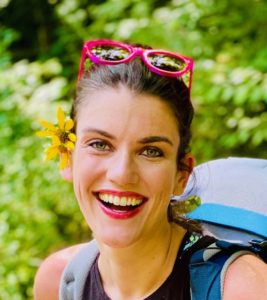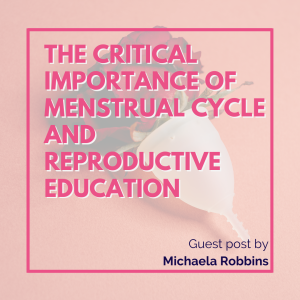Written by my Fall 2020 Apprenticeship Participant, Michaela Robbins. Interested in joining my next Apprenticeship? Sign up for the waitlist here.
In fifth grade, all the girls in my school were sat down to watch “the period movie” (who knows what the actual name was). It was considered a rite of passage to mark the end of elementary school and there was a lot of nervous giggling. It featured a sleepover between two friends reading a puberty book and the mom making ovary shaped pancakes for them the next morning. It was confusing and I didn’t eat pancakes again until I was an adult.
When I was in middle school a friend told me that you couldn’t urinate with a tampon in. I was still learning to insert tampons deftly, so instead of changing my tampons more than absolutely necessary, I held in my pee during the school day. It’s a small miracle that I didn’t end up a walking UTI.
When I was a teenager, I was in the gynecologist’s office for a yeast infection. I was having external itching but I realized that I didn’t know the word for the exact body part that was affected— was this all *waves arm* called the vagina? So, I pointed to avoid using the wrong language.
I was a young newlywed when I realized I didn’t know anything about trying to conceive beyond just having sex. No clue about ovulation, bbt charting, fertile periods, NADA.
WHY AREN’T WE TAUGHT THESE THINGS?
I thought — what probably millions of women have thought at one point of another— why aren’t we taught about our reproductive systems better? Like a lot better.
There is so much secrecy and shame shrouding our periods— from first menstruation onward and it bleeds into the rest of our reproductive education. Instead of teaching menstruators about optimizing our cyclical nature, we sling around insults like, “What, are you on your period or something?”
Why are we using cutesy names for the vagina like “hoo-ha” and “vajayjay” in an effort to avoid making others feel uncomfortable? What is so uncomfortable about our body parts, anyway?
WHAT KIND OF EDUCATION DO WE NEED?
Our educators are in a position to reframe the common notion that periods are “punishment” and menstruating bodies being seen as lesser than.
We also need to be including all genders in reproductive education— there can be no assumptions about who is menstruating and who isn’t. Including our transgender and non-binary community is absolutely vital. Axing binary gender-segregated reproductive education means body literacy across the board.
We desperately need to teach people with a uterus what constitutes a healthy period and what doesn’t. How to care for our vaginas (like not using scented body washes, for one).
How nutrition and lifestyle can positively— or negatively—impact our cycles. And all the little clues bbt charting gives us about our health like thyroid issues, PCOS and anovulatory cycles.
And my gosh, do we need to denormalize pain.
WHAT WOULD IT LOOK LIKE IF WE CHANGED THE NARRATIVE?
Imagine a world where our first menses was celebrated, our period education was robust and period products were safe, affordable and accessible to all. Visualize a future where a teen didn’t have to lean into a friend’s ear whispering they just got “Aunt Flo” and instead confidently asked in a normal voice if someone had a tampon because their period just arrived.
We collectively deserve that. Destigmatizing discussion and education about periods (and reproductive health) empowers both us and our youth. It is our birthright to understand our bodies and how to best “steer the ship.” Including that our bodies encompass power, pleasure and agency. The more of us that stand up to educate, the more there will be to advocate for greater advancement.
WAYS YOU CAN CONTRIBUTE:
- Speaking openly and positively about the menstrual cycle. This includes having face to face discussions with our kids—regardless of gender— about periods well in advance of typical first-menses age (10-15).
- Normalize periods. Some examples could include telling your best friend that you need to reschedule your lunch date because you’re on your period and need to rest. Or, buying period products in front of family members at the grocery store.
- Stop using euphemisms. Terms like “shark week,” “that time of the month” and “code red” might seek innocuous but they contribute to the secrecy and shame around periods.
- Getting yourself and/or your children quality period and reproductive education from a professional. There is zero shame in learning about your body as an adult. If you missed out on this as a teenager, no worries, you can catch up now!
About Michaela

Michaela Robbins is a trauma-informed women’s integrative health coach based out of Pittsburgh, PA. Her education includes the Institute for Integrative Nutrition, the Herbal Academy and the Fix Your Period Apprenticeship with Nicole Jardim. She is a registered yoga teacher with a focus in accessibility and inclusivity. Michaela specializes in period education and rebalancing menstrual cycles through one on one coaching and group classes.



